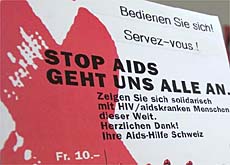Stop Aids campaign uses the power of words

Switzerland's new Aids prevention campaign uses provocative slogans to encourage greater public commitment to safe sex.
The new campaign coincides with a sharp increase in the number of HIV cases in Switzerland, amid fears that people are growing complacent about the disease.
To remind everyone of the dangers, 7,000 posters aimed at specific social and ethnic groups will be distributed across Switzerland from April 22.
For the first time, the bright yellow posters will be hung in and outside places where they are particularly relevant, and they will appear in 18 different languages.
Advice to tourists on how to ask for a condom in German will be placed at airports, and, in a move likely to raise eyebrows, a poster telling priests “if Rome tells you not to talk about contraception, then talk about condoms instead”, will be hung outside Catholic churches.
No more risky pictures
The campaign marks a move away from the Federal Health Office’s use of provocative and even sexually explicit pictures in the Stop Aids campaigns of previous years.
Roger Staub, head of the Stop Aids campaign at the Federal Health Office, said the new style was designed to encourage greater public involvement in the campaign.
“The message ‘please protect yourself’ hasn’t changed,” Staub told swissinfo. “But we are also addressing relevant groups, and saying ‘please act’.”
The campaign asks parents and teachers to talk to children about Aids, and even suggests to godparents that a gift of condoms might be wise once their godchildren have outgrown sweets.
Worrying rise in HIV cases
The new campaign coincides with a rise in HIV cases last year of more than 25 per cent, an increase Swiss health officials describe as “worrying”.
Thomas Zeltner, director of the Federal Health Office, said there appeared to be two groups who were most affected.
“There is a clear trend of increased rates of infection among immigrants from sub Saharan Africa,” Zeltner told swissinfo, “and among gay men, who seem to have lost the awareness they once had about safe sex.”
But Zeltner warned that, just because these two groups have been identified, it doesn’t mean the rest of the population can afford to be complacent.
“Saying that these two groups are particularly affected means they may be precursors for a general rise,” he explained. “We simply don’t know yet, so we must talk to the whole population.”
Another worrying sign is that rates of HIV infection are increasing faster in Switzerland than in neighbouring European countries such as France and Germany. Again, health officials are not sure whether Switzerland is a precursor of what will happen in other countries, or if there are special problems in this country.
Unavoidable message
A second stage of the campaign will be launched in August, with posters targeting sexually active groups, both gay and heterosexual.
Once again, the slogans are intended to be thought provoking and sometimes amusing. “Feeling hot and steamy?” asks one poster, “then slip something on – a condom.”
The campaign is certain to cause debate – and that’s exactly what the Federal Health Office hopes. Any discussion about Aids prevention is, they feel, better than the quiet mood of complacency which they fear has affected many groups.
By midsummer, thousands of the new posters will be up across Switzerland, outside nightclubs, schools, churches, pharmacists, and army training grounds.
So, even for those groups among the population who prefer not to think or talk about Aids, the Federal Health Office has ensured that this year, the message is unavoidable.
swissinfo, Imogen Foulkes
Rates of HIV infection rose by more than 25 per cent in Switzerland last year, but are still well below the peak years of the early 1990s.
In the 12 months to February, 792 new cases were recorded – an increase of 161.
The two main groups affected are gay men and immigrants from sub Saharan Africa.
The Federal Health Office warns that the rise may be a precursor for an increase among the general population.
The new Stop Aids campaign targets specific groups among the population, from priests to parents to soldiers, and encourages them to take an active role in Aids prevention.

In compliance with the JTI standards
More: SWI swissinfo.ch certified by the Journalism Trust Initiative










You can find an overview of ongoing debates with our journalists here . Please join us!
If you want to start a conversation about a topic raised in this article or want to report factual errors, email us at english@swissinfo.ch.